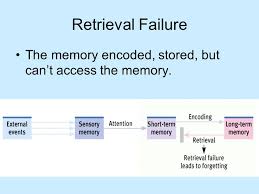Retrieval Failure -Psychology Notes – For W.B.C.S. Examination.
পুনরুদ্ধার ব্যর্থতা-মনোবিজ্ঞান নোটস – WBCS পরীক্ষা।
Retrieval due to absence of cues is sometimes also called cue-dependent forgetting. This is a theory as to why we cannot recall from long term memory.Continue Reading Retrieval Failure -Psychology Notes – For W.B.C.S. Examination.
The suggestion is that internal (such as mood state) and external (such as temperature and smell) cues can help facilitate recall of a long term memory. This theory works on the idea that forgetting in long term memory is due to a lack of access to a memory rather than the availability of a memory. If the context and feelings of the individual are similar for recall to the situation where the memory was originally processed then the chances of recalling the memory will be increased. We forget because the recall is out of content.
This idea is used in a practical way by police when conducting interviews with eyewitnesses. They often use a technique called the cognitive interview which asks eye witnesses to recall every detail and think about the context of the crime (e.g. the weather). The idea is to increase recall by recreating the situation it was witnessed in. They have also asked witnesses to revisit the scene of a crime to prompt recall.
Strengths of the theory
Research support:
There is research support for the theory such as the study by Godden and Baddeley (1975) to suggest that cues can affect recall of information. This strengthens the theory.
Support from levels of Processing:
The levels of processing theory which states that the deeper you think about information the more likely it is to be recalled supports this theory of forgetting as the cues provide a richer level of detail and thus the chance of recall is increased.
Weaknesses of the theory
Ecological validity:
Much of the research on this theory is laboratory based and therefore lacks ecological validity. The studies do not test ‘everyday memory’ and therefore it could be argued the evidence lacks validity.
Practical applications:
The theory has been helpful to forensic and police work as it helps facilitate recall from eye witnesses. This means the theory has a real world practical application making it useful outside of the psychology laboratory.
The tip of the tongue phenomenon illustrates several aspects of the retrieval processes. Retrieval is not an all or nothing process, it is a partial process where bits of information can act as further retrieval.
Please subscribe here to get all future updates on this post/page/category/website


 Toll Free 1800 572 9282
Toll Free 1800 572 9282  mailus@wbcsmadeeasy.in
mailus@wbcsmadeeasy.in



















































































































